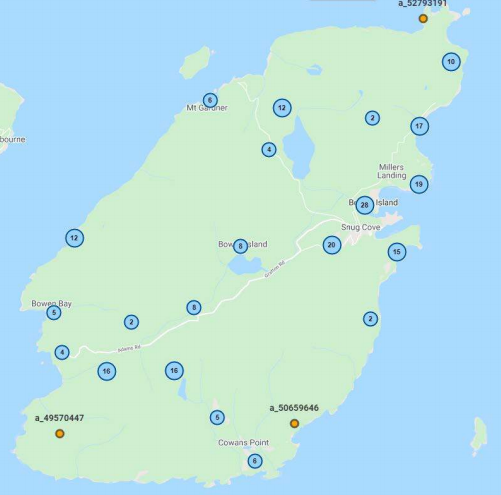Data collection from last month shows the majority of short-term rental accommodations on the island are operating without a business licence.
The municipality approved 41 short-term rental licences in 2021. But last month there were 113 rental locations active on host sites such as Airbnb, leaving 72 unlicenced.
Listings were tracked by the investigative technology company Harmari. A short-term rental is deemed active based on online factors such as host participation, guest feedback, schedule availability, and more. Numbers are updated every week or two, with these results from Jan. 10.
“Business licencing overall is challenging,” says Daniel Martin, manager of planning and development, in a presentation to the Community Economic Development Committee (CEDC) this week.
“Definitely in terms of how many we’ve licenced and how many listings we find, there’s a big gap,” he says.
Martin points to a few reasons for this. One is Bowen only began their business licence program in 2019, and not everyone may be aware when or where they’re required.
But while some of these unlicenced rentals can be chalked up to “lack of awareness”, Martin says others operate under a “lack of awareness that they’ll be noticed.”
And it doesn’t matter how infrequent or short-term a place is rented out, even for a night. “Under our bylaw renting it out and taking money in exchange for your place is a business activity that would need a licence,” says Martin.
The municipality will be keeping a closer eye on this area of local business during 2022, as numbers show short-term rentals are becoming more active now that people are more comfortable with travel compared to earlier stages of the pandemic.
Municipality says unlicenced BNBs can be hard to find
Another challenge with enforcing business licences is finding a specific address to follow up with. Accommodations usually provide a general area or street in their listing, and give out the specific address in conversation with the renter. This makes it harder to track the unit down to open a file.
“When we have contact information we are contacting them,” says Martin when a rental is narrowed down to a property. “The initial step is informing people that ‘Oh, it seems like you have an active listing, did you know that you require a business licence?’ And then it can progress to enforcement if it doesn’t happen.”
The municipality currently has several files open on island properties. Enforcement steps begin with education, then escalate to warnings, and ultimately fines if a business licence isn’t obtained.
Martin says the data from Harmari will be the key to ensuring as many short-term rentals as possible become compliant.
“Quite often people will come back and say ‘Oh well it’s not active, I’m not taking guests anymore. I’ve taken it down,’” says Martin on owner responses.
“Sometimes that’s the case, and sometimes we can look back and say ‘Well, people reviewed staying in your place last weekend and the weekend before and the weekend before that.’ It can be quite useful that way,” he says of the collected data.
The CEDC decided to keep an eye on the situation moving forward. “This is just a snapshot. Data often becomes meaningful as a pattern over time,” says Coun. Maureen Nicholson.
“As we get layer and layer and layer of snapshots then we’ll be able to do some sort of comparison and say something a lot more meaningful than we can say tonight.”
Nicholson was pleased with Bowen’s total number of business licences overall, up to 504 last year. This included 110 contractors, after a new rule kicked in for 2021 requiring every company involved in a build to have a licence. Previously this was only required of the primary builder.
“I see the number of off-island contractors who are licenced for doing business on Bowen as a bit of an opportunity,” says Nicholson. “I think it underscores the need for industrially-zoned land on-island. Some of those contractors might very well need space over here or might want to relocate their business.”
Nicholson was also glad to see revenue from the business licence program was covering the staff costs of implementing it.


.png;w=120;h=80;mode=crop)